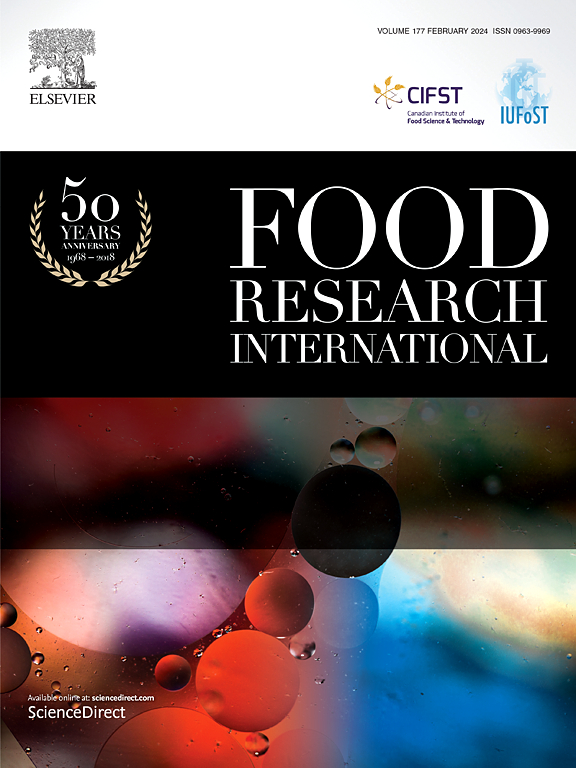Identification of immunomodulatory peptides from crocodile head protein hydrolysates: Targeted screening and immunomodulatory activity by activating NF-κB signaling pathway
IF 7
1区 农林科学
Q1 FOOD SCIENCE & TECHNOLOGY
引用次数: 0
Abstract
Long-term unhealthy lifestyles are prone to triggering immune disorders, leading to infections and chronic diseases, posing serious health risks. Immunomodulatory peptides, with the advantages of being natural and having low toxicity and few side effects, contribute to maintaining immune balance. However, their mechanism of action remains unclear. It is crucial to conduct in-depth research on immunomodulatory peptides to understand their potential health benefits. This study aims to identify novel immunomodulatory peptides from the crocodile (Crocodylus siamensis) head protein hydrolysates (CHPHs) and explore their intracellular immunomodulatory mechanisms. Four crocodile-derived peptides with potential immunomodulatory activity were screened from CHPHs, i.e., AKLDLEEVIK (AK-10), LEKEKSELK (LEK-9), DFLDLPSIER (DR-10), and LDLEEVIKK (LDK-9), which stably bind to TLR4-MD2 and activate the immune response. These four peptides promoted the proliferative and phagocytic activities of RAW264.7 cells, activated the resting state of the cells, and boosted the expression of NO and cytokines. Peptide DR-10 had the most significant immunomodulatory function and promoted up-regulation of intracellular immune-related factors Acod1, Ccl9, COX2, CD40, NF-κB1, IKKε, and NF-κB2. Additionally, the peptide DR-10 activated the NF-κB signaling pathway, thereby releasing immune effectors and exerting immune effects. These findings suggest that crocodile-derived immunomodulatory peptides may be considered an effective immune supplement, providing new ideas for future research on dietary supplements.
鳄鱼头蛋白水解产物免疫调节肽的鉴定:通过激活NF-κB信号通路的靶向筛选和免疫调节活性
长期不健康的生活方式容易引发免疫紊乱,导致感染和慢性疾病,构成严重的健康风险。免疫调节肽具有天然、低毒、副作用少等优点,有助于维持免疫平衡。然而,它们的作用机制尚不清楚。对免疫调节肽进行深入研究以了解其潜在的健康益处至关重要。本研究旨在从鳄鱼(Crocodylus siamensis)头部蛋白水解物(CHPHs)中鉴定新的免疫调节肽,并探讨其细胞内免疫调节机制。从chph中筛选出4个具有潜在免疫调节活性的鳄鱼源肽,分别是AKLDLEEVIK (AK-10)、LEKEKSELK (LEK-9)、DFLDLPSIER (DR-10)和LDLEEVIKK (LDK-9),它们稳定地与TLR4-MD2结合并激活免疫应答。这4种多肽均能促进RAW264.7细胞的增殖和吞噬活性,激活细胞静息状态,促进NO和细胞因子的表达。肽DR-10的免疫调节作用最为显著,可促进细胞内免疫相关因子Acod1、Ccl9、COX2、CD40、NF-κB1、IKKε、NF-κB2的上调。肽DR-10激活NF-κB信号通路,释放免疫效应器,发挥免疫作用。这些发现提示鳄鱼源性免疫调节肽可能被认为是一种有效的免疫补充剂,为未来膳食补充剂的研究提供了新的思路。
本文章由计算机程序翻译,如有差异,请以英文原文为准。
求助全文
约1分钟内获得全文
求助全文
来源期刊

Food Research International
工程技术-食品科技
CiteScore
12.50
自引率
7.40%
发文量
1183
审稿时长
79 days
期刊介绍:
Food Research International serves as a rapid dissemination platform for significant and impactful research in food science, technology, engineering, and nutrition. The journal focuses on publishing novel, high-quality, and high-impact review papers, original research papers, and letters to the editors across various disciplines in the science and technology of food. Additionally, it follows a policy of publishing special issues on topical and emergent subjects in food research or related areas. Selected, peer-reviewed papers from scientific meetings, workshops, and conferences on the science, technology, and engineering of foods are also featured in special issues.
 求助内容:
求助内容: 应助结果提醒方式:
应助结果提醒方式:


